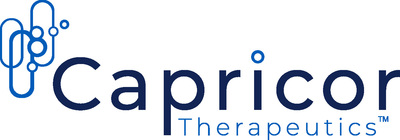Capricor Therapeutics Advances Clinical Development Program in Duchenne Muscular Dystrophy with Naming of Principal Investigator
Internationally Recognized Expert Craig McDonald, M.D. to Lead Upcoming HOPE-2 Clinical Trial of CAP-1002
LOS ANGELES, Sept. 26, 2017 /PRNewswire/ -- Capricor Therapeutics, Inc. (NASDAQ: CAPR), which is developing biological therapies for Duchenne muscular dystrophy (DMD) and other rare diseases, today announced that the national principal investigator for its HOPE-2 Trial will be Craig M. McDonald, M.D., a distinguished thought leader in the clinical management of neuromuscular diseases, including muscular dystrophies, and the development of novel outcome measures for DMD clinical trials.
The HOPE-2 Trial is being planned as a randomized, double-blind, placebo-controlled Phase II clinical trial that will evaluate repeat dosing of intravenous CAP-1002 (allogeneic cardiosphere-derived cells) in boys and young men with DMD. Subject to regulatory approval, Capricor plans to commence enrollment in this trial in the first quarter of 2018.
"Dr. McDonald is one of the world's leading experts in the field of Duchenne muscular dystrophy, and we're delighted that he will be leading the HOPE-2 clinical trial as CAP-1002 advances toward potential registration," said Linda Marbán, Ph.D., Capricor's president and chief executive officer.
Dr. McDonald, a professor of pediatrics, chair of the Department of Physical Medicine and Rehabilitation, director of Rehabilitation Services and director of the Neuromuscular Disease Clinics at UC Davis Health, brings an unusual depth and breadth of expertise with regard to trial design and the development of clinical endpoints and outcome measures to evaluate therapeutic candidates for neuromuscular diseases.
Dr. McDonald has served as principal investigator for more than 30 industry sponsored trials for DMD. He is a clinical investigator for the Duchenne Natural History Study of the Cooperative International Neuromuscular Research Group, which is a consortium of medical and scientific investigators from academic and research centers who share the common goal of aiming to positively impact the lives of neuromuscular disease patients and their families by conducting well-controlled clinical studies.
Dr. McDonald has also served on numerous National Institutes of Health (NIH) study sections reviewing research proposals relating to neuromuscular diseases and rehabilitation sciences, as well as multiple national and international steering committees and advisory boards for clinical trial development. In addition, he has participated in NIH expert panels on clinical outcome measures in pediatric neuromuscular diseases and natural history studies in varied pediatric rare diseases. Over the course of his career, Dr. McDonald has authored more than 120 peer-reviewed publications.
About CAP-1002
CAP-1002 consists of allogeneic cardiosphere-derived cells, or CDCs, a type of progenitor cell that has been shown to exert potent immuno-modulatory activity. CDCs have been the subject of over 100 peer-reviewed scientific publications and have been administered to approximately 140 human subjects across several clinical trials.
About Duchenne Muscular Dystrophy
DMD is a genetic disorder characterized by progressive muscle degeneration and weakness. It is caused by an abnormality in the dystrophin complex, a structural element that plays a critical role in muscle fiber integrity, which leads to chronic muscle damage. Patients with DMD typically die in their twenties, most commonly due to heart disease. The incidence of DMD is estimated to be one in every 3,600 live male births, and DMD is believed to afflict approximately 15,000 to 20,000 boys and young men in the U.S.
About Capricor Therapeutics
Capricor Therapeutics, Inc. (NASDAQ: CAPR) is a clinical-stage biotechnology company developing first-in-class biological therapies. Capricor's lead candidate, CAP-1002, is a cell-based candidate currently in clinical development for the treatment of DMD. Capricor is also exploring the potential of CAP-2003, a cell-free, exosome-based candidate, to treat a variety of disorders. For more information, visit www.capricor.com.
Cautionary Note Regarding Forward-Looking Statements
Statements in this press release and other Company statements regarding the efficacy, safety and intended utilization of Capricor's product candidates; the initiation, conduct, size, timing and results of discovery efforts and clinical trials; the pace of enrollment of clinical trials; plans regarding regulatory filings, future research and clinical trials; the timing of regulatory approvals; plans regarding current and future collaborative activities and the ownership of commercial rights; scope, duration, validity and enforceability of intellectual property rights; future royalty streams, expectations with respect to the expected use of proceeds from the recently completed offerings and the anticipated effects of the offerings, and any other statements about Capricor's management team's future expectations, beliefs, goals, plans or prospects constitute forward-looking statements within the meaning of the Private Securities Litigation Reform Act of 1995. Any statements that are not statements of historical fact (including statements containing the words "believes," "plans," "could," "anticipates," "expects," "estimates," "should," "target," "will," "would" and similar expressions) should also be considered to be forward-looking statements. There are a number of important factors that could cause actual results or events to differ materially from those indicated by such forward-looking statements. More information about these and other risks that may impact Capricor's business is set forth in Capricor's Annual Report on Form 10-K for the year ended December 31, 2016, as filed with the Securities and Exchange Commission on March 16, 2017, in its Registration Statement on Form S-3, as filed with the Securities and Exchange Commission on September 28, 2015, together with the prospectus included therein and the prospectus supplements thereto, and in its Quarterly Report on Form 10-Q for the quarter ended June 30, 2017, as filed with the Securities and Exchange Commission on August 14, 2017. All forward-looking statements in this press release are based on information available to Capricor as of the date hereof, and Capricor assumes no obligation to update these forward-looking statements.
CAP-1002 is an Investigational New Drug and is not approved for any indications. Capricor's exosomes technology, including CAP-2003, has not yet been approved for clinical investigation.
For more information, please contact:
AJ Bergmann, Vice President of Finance
+1-310-358-3200
abergmann@capricor.com

View original content with multimedia:http://www.prnewswire.com/news-releases/capricor-therapeutics-advances-clinical-development-program-in-duchenne-muscular-dystrophy-with-naming-of-principal-investigator-300525607.html
SOURCE Capricor Therapeutics, Inc.
Released September 26, 2017